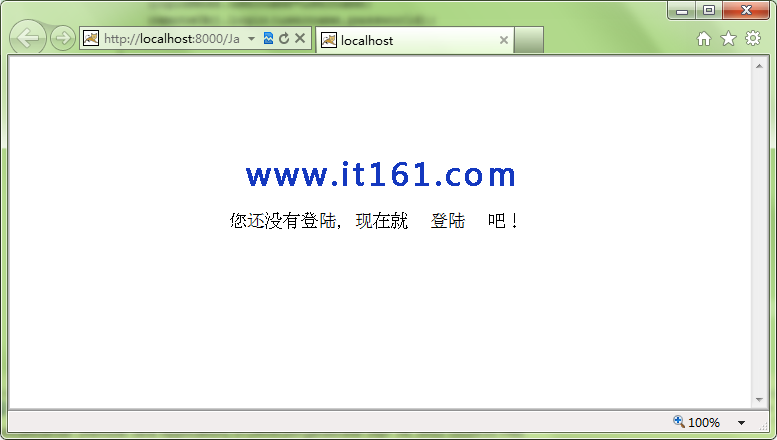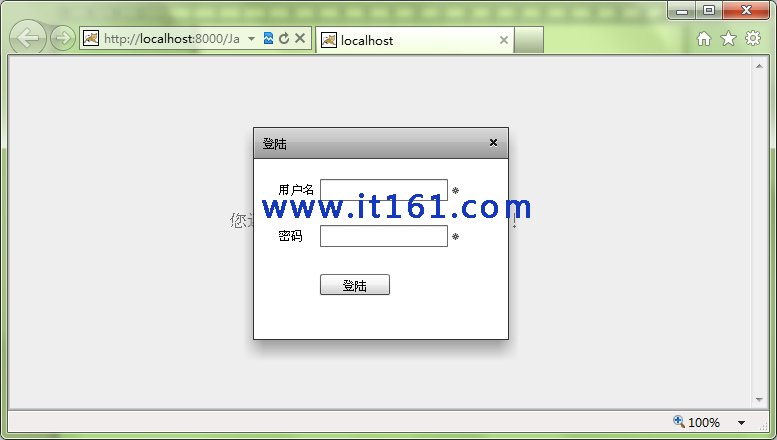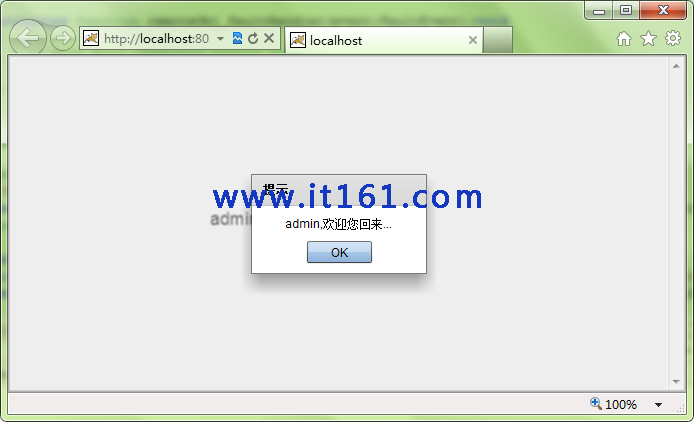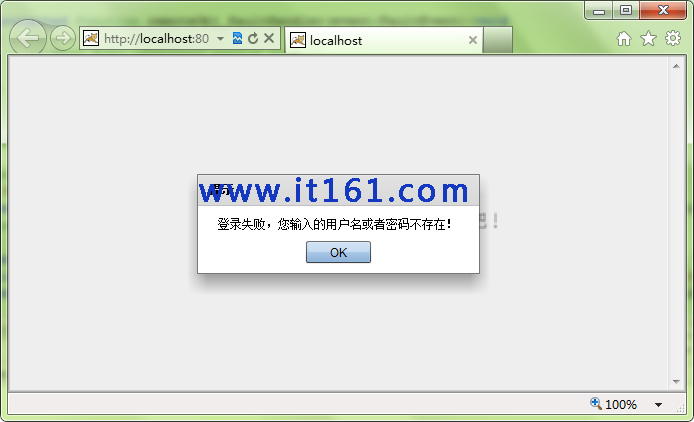Flex与Java通信之RemoteObject方式
2014-01-11 22:48
579 查看
在学习了flash中的事件机制后,我们就开始学习flex与Java中的3种通信方式。Flex与Java通信有3中方式:
●flex访问Java普通类使用RemoteObject方式,这也是用的最多的一种方式。
●flex访问Java服务器类(如servlet)用HttpService方式。
●Flex与WebService交互用WebService方式。
今天就先来学习flex访问普通Java类。在学习之前我们需要考虑这么一个问题:由于我们这3个例子都是以登陆为例子进行的,所以尽量让登陆界面分离出来可以重复使用,这用到Flex中的module。我们怎么将module中的数值传到父窗口去呢?我们又想到上节中学习的自定义事件。好了,既然想通了,就开始今天的学习。
将MyEclipse切换到MyEclipse视图,新建一个与flex交互的普通Java类,代码如下所示:
在WebRoot/WEB-INF/flex目录下的remoting-config.xml文件中添加如下所示代码:
将MyEclipse切换到Flash视图,首先自定义一个事件类LoginEvent.as,为以后传值服务,代码如下所示:
在这个类中我们定义了一个事件类型LOGIN_EVENT,定义了一个Object类型的变量,用于存值。
接着新建一个登陆信息的VO类LoginMess.as,为以后存贮用户信息服务,代码如下所示:
新建一个登陆界面,新建一个MXMLModule文件LoginModule.mxml,代码如下所示:
这个页面以后我们反复使用,这就是module文件的优点之一。在这个页面中我们不处理与Java交互的部分,因为既然是公共页面,我们应该将于Java交互的部分放在相应引用的文件中。
接着创建主页面RemoteObjectDemo.mxml,代码如下所示:
好了,页面与类算是处理完了,打开服务器并部署项目,运行felx页面RemoteObjectDemo.mxml,如下所示:

当我们点击“登陆”按钮后,弹出module页面,如下所示:

当我们输入的用户名和密码都正确时则提示你登陆正确:

输入错误则提示你输入不正确:

可以看出,我们输入的用户名与密码与Java中的login方法进行了交互。
好了,就学习这么多,下节将学习HttpService方式。
原创文章,转载请注明出处:http://www.it161.com/article/webDetail?articleid=140111224840
更多原创内容,请访问:http://www.it161.com/
●flex访问Java普通类使用RemoteObject方式,这也是用的最多的一种方式。
●flex访问Java服务器类(如servlet)用HttpService方式。
●Flex与WebService交互用WebService方式。
今天就先来学习flex访问普通Java类。在学习之前我们需要考虑这么一个问题:由于我们这3个例子都是以登陆为例子进行的,所以尽量让登陆界面分离出来可以重复使用,这用到Flex中的module。我们怎么将module中的数值传到父窗口去呢?我们又想到上节中学习的自定义事件。好了,既然想通了,就开始今天的学习。
将MyEclipse切换到MyEclipse视图,新建一个与flex交互的普通Java类,代码如下所示:
| 1 2 3 4 5 6 7 8 9 10 11 12 13 | package com.it161.test; public class RemoteObjectDemo { public boolean login(String username,String passworld ){ if(username.equals("admin")&&passworld.equals("123")){ returntrue; }else{ returnfalse; } } } |
| 1 2 3 4 5 | <destination id="remoteObjectDemo"> <properties> <source>com.yqsn.test.RemoteObjectDemo</source> </properties> </destination> |
| 1 2 3 4 5 6 7 8 9 10 11 12 13 14 15 16 17 18 19 20 21 22 23 24 25 26 27 28 | package com.it161.ases { import flash.events.Event; public class LoginEvent extends Event { public static const LOGIN_EVENT:String="LOGIN_EVENT"; private var _loginMess:Object; public function LoginEvent(type:String,loginMess:Object=null, bubbles:Boolean=false,cancelable:Boolean=false) { this._loginMess=loginMess; super(type, bubbles, cancelable); } public functionget loginMess():Object { return _loginMess; } public functionset loginMess(value:Object):void { _loginMess = value; } } } |
接着新建一个登陆信息的VO类LoginMess.as,为以后存贮用户信息服务,代码如下所示:
| 1 2 3 4 5 6 7 8 9 10 11 12 13 14 15 16 17 18 19 20 21 22 23 24 25 26 27 28 29 30 31 32 33 34 35 36 | package com.it161.ases { publicclass LoginMess { private var _username:String; privatevar _passworld:String; publicfunction LoginMess() { } publicfunctionget passworld():String { return _passworld; } publicfunctionset passworld(value:String):void { _passworld = value; } publicfunctionget username():String { return _username; } publicfunctionset username(value:String):void { _username = value; } } } |
| 1 2 3 4 5 6 7 8 9 10 11 12 13 14 15 16 17 18 19 20 21 22 23 24 25 26 27 28 29 30 31 32 33 34 35 36 37 38 39 40 41 42 43 44 45 46 47 48 49 50 51 52 53 54 55 56 57 58 59 60 61 62 63 64 | <?xmlversion="1.0" encoding="utf-8"?> <s:Module xmlns:fx=" http://ns.adobe.com/mxml/2009" xmlns:s=" library://ns.adobe.com/flex/spark" xmlns:mx=" library://ns.adobe.com/flex/mx" width="256" height="213"> <fx:Script> <![CDATA[ import com.flex.ases.LoginEvent; import mx.controls.Alert; import mx.events.CloseEvent; import mx.managers.PopUpManager; protectedfunction login_clickHandler(event:MouseEvent):void { // TODOAuto-generated method stub var loginMess:Object=new Object; loginMess.username=userName.text; loginMess.passworld=passworld.text; if(userName.text=="" ||passworld.text==""){ Alert.show("用户名或密码不能为空!"); return; } this.dispatchEvent(newLoginEvent(LoginEvent.LOGIN_EVENT,loginMess)); userName.text=""; passworld.text=""; PopUpManager.removePopUp(this); } protectedfunction loginTitleWindow_closeHandler(event:CloseEvent):void { // TODO Auto-generatedmethod stub userName.text=""; passworld.text=""; PopUpManager.removePopUp(this); } ]]> </fx:Script> <fx:Declarations> <!-- Place non-visualelements (e.g., services, value objects) here --> </fx:Declarations> <s:TitleWindow x="1" y="1" width="256"height="213" title="登陆"id="loginTitleWindow" close="loginTitleWindow_closeHandler(event)" > <s:Form width="100%" height="183" > <s:FormItem left="60" height="39" width="224" label="用户名" required="true" > <s:TextInput id="userName" /> </s:FormItem> <s:FormItem required="true" width="224" label="密码" > <s:TextInput id="passworld" displayAsPassword="true" /> </s:FormItem> <s:FormItem width="227"> <s:Button id="login" label="登陆" click="login_clickHandler(event)"/> </s:FormItem> </s:Form> </s:TitleWindow> </s:Module> |
接着创建主页面RemoteObjectDemo.mxml,代码如下所示:
| 1 2 3 4 5 6 7 8 9 10 11 12 13 14 15 16 17 18 19 20 21 22 23 24 25 26 27 28 29 30 31 32 33 34 35 36 37 38 39 40 41 42 43 44 45 46 47 48 49 50 51 52 53 54 55 56 57 58 59 60 61 62 63 64 65 66 67 68 | <?xml version="1.0"encoding="utf-8"?> <s:Application xmlns:fx=" http://ns.adobe.com/mxml/2009" xmlns:s=" library://ns.adobe.com/flex/spark" xmlns:mx=" library://ns.adobe.com/flex/mx" width="100%" height="100%"> <fx:Script> <![CDATA[ import com.flex.ases.LoginEvent; import com.flex.ases.LoginMess; import com.flex.component.LoginTitleWindow; import com.flex.module.LoginModule; import mx.collections.ArrayCollection; import mx.controls.Alert; import mx.managers.PopUpManager; import mx.rpc.events.FaultEvent; import mx.rpc.events.ResultEvent; [Bindable] privatevar loginMess:LoginMess=new LoginMess(); privatevar loginModule:LoginModule=new LoginModule(); protectedfunction login_clickHandler(event:MouseEvent):void { PopUpManager.addPopUp(loginModule,this,true); PopUpManager.centerPopUp(loginModule); loginModule.addEventListener(LoginEvent.LOGIN_EVENT,getLoginMess); } publicfunction getLoginMess(event:LoginEvent):void{ var username:String=event.loginMess['username']; var passworld:String=event.loginMess['passworld']; loginMess.username=username; remoteObj.login(username,passworld); } protectedfunction remoteObj_resultHandler(event:ResultEvent):void { // TODOAuto-generated method stub var str:Boolean=event.result as Boolean; if(str){ Alert.show(loginMess.username+",欢迎您回来...","提示"); aaa.text=loginMess.username+",欢迎归来..."; bbb.text=""; login.label=""; }else{ Alert.show("登录失败,您输入的用户名或者密码不存在!","提示"); } } protectedfunction remoteObj_faultHandler(event:FaultEvent):void { // TODOAuto-generated method stub Alert.show(event.fault.message,"出错了"); } ]]> </fx:Script> <fx:Declarations> <!-- Place non-visualelements (e.g., services, value objects) here --> <s:RemoteObject id="remoteObj" destination="remoteObjectDemo"result="remoteObj_resultHandler(event)"fault="remoteObj_faultHandler(event)" /> </fx:Declarations> <s:Label x="219" y="150" width="182" height="27" fontSize="18" id="aaa" text="您还没有登陆,现在就" verticalAlign="middle"/> <mx:LinkButton x="409" y="150" width="57" height="27" label="登陆" id="login" fontSize="18"click="login_clickHandler(event)"/> <s:Label x="478" y="150" width="37" height="27" id="bbb" fontSize="18" text="吧!" verticalAlign="middle"/> </s:Application> |

当我们点击“登陆”按钮后,弹出module页面,如下所示:

当我们输入的用户名和密码都正确时则提示你登陆正确:

输入错误则提示你输入不正确:

可以看出,我们输入的用户名与密码与Java中的login方法进行了交互。
好了,就学习这么多,下节将学习HttpService方式。
原创文章,转载请注明出处:http://www.it161.com/article/webDetail?articleid=140111224840
更多原创内容,请访问:http://www.it161.com/
相关文章推荐
- Java与Flex学习笔记(4)----Flex与Java通信之RemoteObject方式
- Flex 与 Java通信 RemoteObject 方式
- Flex与Java通信之RemoteObject方式
- flex用RemoteObject方式与java交互
- Flex-前段actionScript类与Java类的对应(RemoteObject通信-amf)
- Flex-前段actionScript类与Java类的对应(RemoteObject通信-amf)
- Flex基本通信方式(http,webservice,remoteObject)
- flex的remoteobject方式调用java的方法
- Flex中用RemoteObject与java后台通信
- 如何使用Flex RemoteObject components(含java/flex类之间的转换)TESTED
- Flex与Java通信之HttpService方式
- flex与java的一种通信方式
- Java+Flex整合应用简单示例 (mx:RemoteObject)
- Flex一个RemoteObject调用JAVA对象里面的多个方法(转)
- Flex与服务器交互之四(使用RemoteObject +BlazeDS+TomCat同Java交互及开发环境配置)
- Flex与Java通信 BlazeDS方式 最详尽的解析
- flex 和 .net通过fluorineFX remoteobject通信详解:
- Java与Flex学习笔记(5)----Flex与Java通信之HttpService方式
- flex和java交互的三种方法之二:Remote Object
- Flex与Java通信 BlazeDS方式 查询
